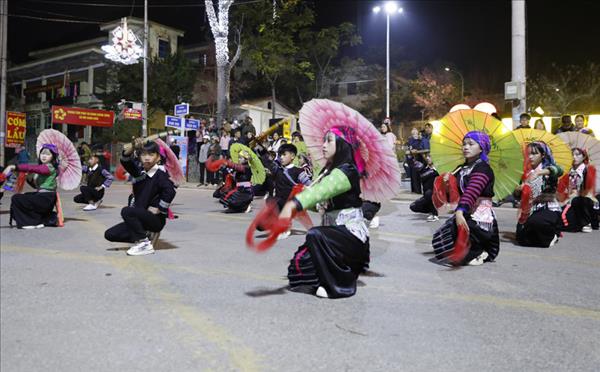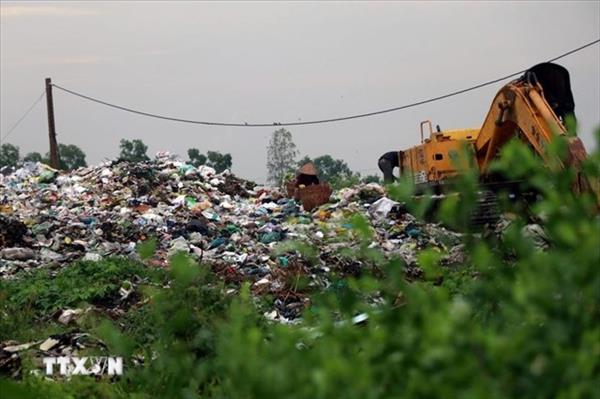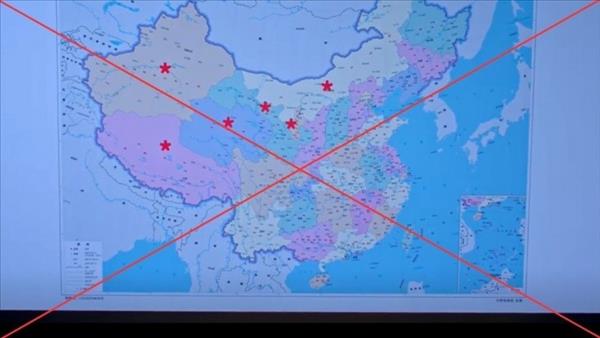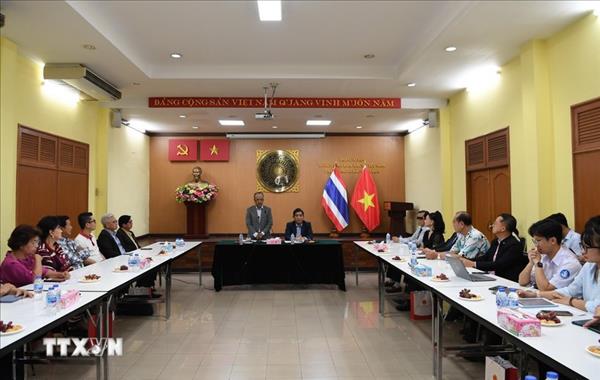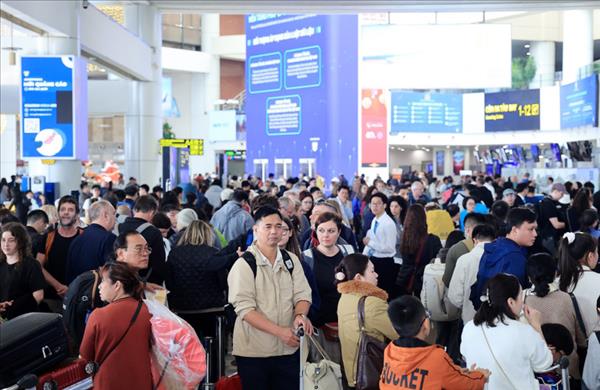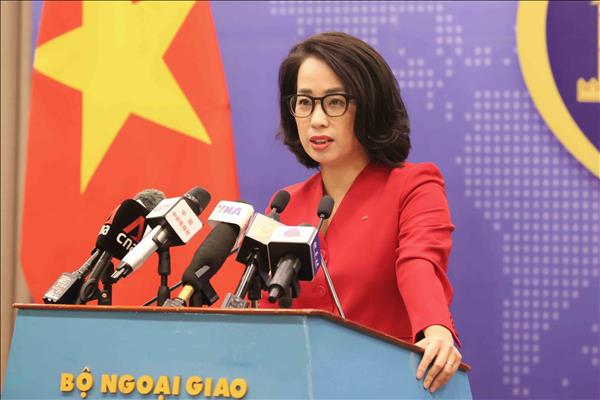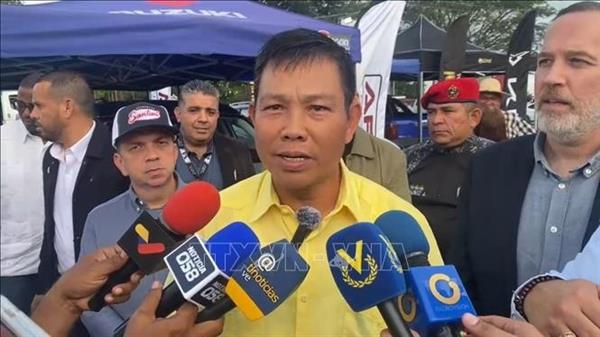Hanoi, April 25 (VNA) – Minister of Agriculture and Rural Development Cao Duc Phat and US Secretary of Agriculture Thomas J.Vilsack held talks in Hanoi on April 25 to enhance collaboration in agriculture, forestry and seafood between the two countries.
According to the Vietnamese ministry, the country’s agro-forestry-fisheries exports to the US still face a number of difficulties and unfair treatment. The procedures to grant an export licence for Vietnamese fruit to the market are complicated, costly and time-consuming. So far, only four kinds of Vietnamese fruit, namely dragon fruit, rambutan, longan, and lychee are licensed to enter the US, but with high export costs.
Vietnam has sent a draft report on the probable risk assessment (PRA) of mango and star apple to the US Department of Agriculture (USDA)’s Animal and Plant Health Inspection Service (APHIS) and proposed APHIS hand over the inspection of fruit irradiation to the Vietnamese ministry’s Plant Protection Department. Vietnam has effectively coordinated with the US in this field since 2008.
The US Environmental Protection Agency (EPA) and the US Food and Drug Administration (FDA) are imposing the zero maximum residue limits (MRL) on some unregistered drugs in the US but are allowed to be used in other countries. This has caused difficulties for Vietnamese exporters. On the other hand, Vietnamese farm produce has to follow regulations on food safety from separate US states.
Regarding seafood, Vietnamese shrimp and tra fish exported to the US last year received unfair treatment and continuously experienced anti-dumping and anti-subsidy lawsuits, which significantly affected the two countries’ trade ties as well as the jobs and incomes of millions of Vietnamese farmers and businesses.
The USDA has ruled the establishment of an inspection programme for Siluriformes fish, including Vietnamese tra and basa fish, which came into effect from March 1, 2016. Accordingly, the export countries have a transitional period of 18 months (until August 31, 2017) to adjust their production systems in line with the new regulations of the US.
The implementation of the programme within 18 months is difficult for Vietnam due to the country’s significant difference in production conditions and level of development from the US. This might interrupt trade activities and affect millions of Vietnamese farmers and exporters. Therefore, Vietnam proposed the US extend the time limit for the country to meet the programme’s regulations.
The Vietnamese Ministry of Agriculture and Rural Development hopes to strengthen cooperation with the US in smart agriculture to cope with climate change, Minister Phat said, adding that the US is expected to help the Southeast Asian country enhance capacity in the fields of biological and hi-tech agriculture, food hygiene and safety, and flora and fauna inspection.
He asked the US to support Vietnam in evaluating aquatic resources and realising commitments in the environment programme under the Trans-Pacific Partnership (TPP) Agreement – to which both nations are members.
Currently, the US is the second most important farm produce market of Vietnam, after China, with an export turnover of 5.69 billion USD and imports of 1.4 billion USD in 2015.
In the first quarter of 2016, Vietnam earned over 1.3 billion USD from selling agro-forestry-fisheries products to the US, mainly wood and timber products, seafood, cashew nuts, coffee and pepper. Vietnam also imported nearly 298 million USD worth of goods from the market.
Vietnam’s agro-forestry-fisheries exports to the US recorded an annual growth of almost 20 percent over the past three years, with wood and timber products and seafood being key staples.
According to the Vietnamese ministry, the country’s agro-forestry-fisheries exports to the US still face a number of difficulties and unfair treatment. The procedures to grant an export licence for Vietnamese fruit to the market are complicated, costly and time-consuming. So far, only four kinds of Vietnamese fruit, namely dragon fruit, rambutan, longan, and lychee are licensed to enter the US, but with high export costs.
Vietnam has sent a draft report on the probable risk assessment (PRA) of mango and star apple to the US Department of Agriculture (USDA)’s Animal and Plant Health Inspection Service (APHIS) and proposed APHIS hand over the inspection of fruit irradiation to the Vietnamese ministry’s Plant Protection Department. Vietnam has effectively coordinated with the US in this field since 2008.
The US Environmental Protection Agency (EPA) and the US Food and Drug Administration (FDA) are imposing the zero maximum residue limits (MRL) on some unregistered drugs in the US but are allowed to be used in other countries. This has caused difficulties for Vietnamese exporters. On the other hand, Vietnamese farm produce has to follow regulations on food safety from separate US states.
Regarding seafood, Vietnamese shrimp and tra fish exported to the US last year received unfair treatment and continuously experienced anti-dumping and anti-subsidy lawsuits, which significantly affected the two countries’ trade ties as well as the jobs and incomes of millions of Vietnamese farmers and businesses.
The USDA has ruled the establishment of an inspection programme for Siluriformes fish, including Vietnamese tra and basa fish, which came into effect from March 1, 2016. Accordingly, the export countries have a transitional period of 18 months (until August 31, 2017) to adjust their production systems in line with the new regulations of the US.
The implementation of the programme within 18 months is difficult for Vietnam due to the country’s significant difference in production conditions and level of development from the US. This might interrupt trade activities and affect millions of Vietnamese farmers and exporters. Therefore, Vietnam proposed the US extend the time limit for the country to meet the programme’s regulations.
The Vietnamese Ministry of Agriculture and Rural Development hopes to strengthen cooperation with the US in smart agriculture to cope with climate change, Minister Phat said, adding that the US is expected to help the Southeast Asian country enhance capacity in the fields of biological and hi-tech agriculture, food hygiene and safety, and flora and fauna inspection.
He asked the US to support Vietnam in evaluating aquatic resources and realising commitments in the environment programme under the Trans-Pacific Partnership (TPP) Agreement – to which both nations are members.
Currently, the US is the second most important farm produce market of Vietnam, after China, with an export turnover of 5.69 billion USD and imports of 1.4 billion USD in 2015.
In the first quarter of 2016, Vietnam earned over 1.3 billion USD from selling agro-forestry-fisheries products to the US, mainly wood and timber products, seafood, cashew nuts, coffee and pepper. Vietnam also imported nearly 298 million USD worth of goods from the market.
Vietnam’s agro-forestry-fisheries exports to the US recorded an annual growth of almost 20 percent over the past three years, with wood and timber products and seafood being key staples.
VNA/VNP

